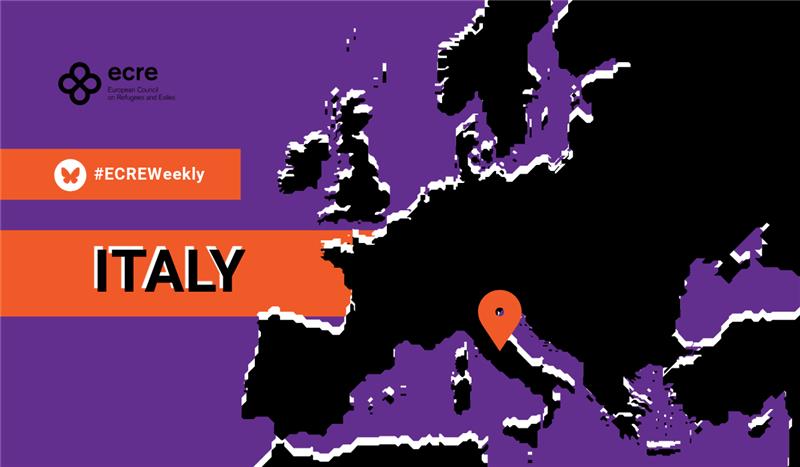- Prime Minister Giorgia Meloni has participated in an informal meeting on migration in the margins of the latest European Council summit.
- A recent media investigation has added to the longstanding criticism of the Italy-Albania migration agreement.
- Six members of a search and rescue organisation have gone on trial in Sicily.
- The International Criminal Court has ruled that Italy failed to meet its obligations in the Almasri case.
- The Italian parliament has approved the renewal of the 2017 Italy-Libya Memorandum of Understanding on migration co-operation.
Prime Minister Giorgia Meloni has participated in an informal meeting on migration in the margins of the latest European Council summit. The gathering, which took place on 23 October in Brussels, was attended by leaders from 13 EU member states and the president of the European Commission. During the meeting, Meloni argued that the European Convention on Human Rights (ECHR) should better address the challenges posed by irregular migration. One EU diplomat told the EUobserver news agency: “There is this push from Italy looking at the Article 8 in the Convention on sending back criminals, so that it would be more flexible”. According to an Italian government press release, officials from the participating countries will meet on 5 November in Rome to continue their joint work.
A recent media investigation has added to the longstanding criticism of the Italy-Albania migration agreement. The investigation, which was conducted by Dutch investigative collective Spit and Italian publication Altreconomia, has raised a number of questions about the two repurposed repatriation centres in Albania, including about the conduct of Medihospes, the company that was awarded the €133 million contract to manage the facilities on behalf of the Italian state.
Six members of a search and rescue organisation have gone on trial in Sicily. The defendants, who are from the NGO Mediterranea Saving Humans (MSH), are accused of “aggravated facilitation of illegal immigration” for their part in a rescue operation that took place in August 2020. According to MSH, a group of people, including a pregnant woman and a child, had been rescued from a sinking boat by a Danish oil tanker but they were forced to remain on board the ship for more than 5 weeks after European authorities refused to assign it a safe port. Eventually, the 27 victims were transferred from the Danish ship to the MSH’s Mare Jonio rescue vessel which disembarked them in the Sicilian port of Pozzallo. Three months after the event, the company that owned the oil tanker made a donation to MSH which the public prosecutor’s office in Ragusa has used as grounds to accuse the organisation of acting for a “profit motive”. In a statement issued shortly before the opening of the trial, MSH said: “For us, this will be an opportunity to re-establish the full truth and legitimacy of what happened – and to turn this absurd accusation against sea rescue and solidarity into a trial against those who, at sea, allow women, men, and children to die in massacres like the one in Cutro, or through deliberate failures to rescue that cause suffering and death”.
The International Criminal Court (ICC) has ruled that Italy failed to meet its obligations in the Almasri case. In a statement issued on 17 October, the ICC said that by refusing to execute its order and failing to co-operate in the incident which took place in January, the Italian government had breached its duties under the Rome Statute. The Italian government has until 31 October to provide information on any relevant domestic proceedings, along with an explanation of how these proceedings might affect its future co-operation with the ICC.
The Italian parliament has approved the renewal of the 2017 Italy-Libya Memorandum of Understanding (MoU) on migration co-operation. On 15 October, 153 MPs voted in favour of renewing the MoU for another three years. Opposition parties had demanded an end to all forms of co-operation with Libya, citing violations of the principle of non-refoulement due to the forced return of people fleeing the country. Their concerns were also echoed by a number of human rights NGOs. “The Italy-Libya Memorandum of Understanding has proven to be a framework for violence and suffering, and should be revoked, not renewed,” said Judith Sunderland from Human Rights Watch on 13 October, adding: “Italy needs to stop its complicity with the Libyan Coast Guard, who are implicated in the torture, exploitation, and degrading treatment of the people they interdict and bring back to Libya”. On 18 October, hundreds of people gathered in Rome to protest against the renewal of the MoU.
Related articles
- ITALY: Another NGO ship detained in Sicily ― 60-day detention for NGO ship impounded in August ― Supreme Court questions constitutionality of detention without validation ― Senior official under investigation in Libyan warlord affair ― Local governments request crisis talks on hosting asylum applicants (September 2025)
- EU MARITIME BORDERS: Several tragedies in the Mediterranean ― First footage of Libyan militiamen in brutal people smuggling operations ― Spanish Navy chief issues stark reminder about the Law of the Sea ― Fatal accident in the Aegean ― French police accused of causing deaths in Indian Ocean (August 2025)

